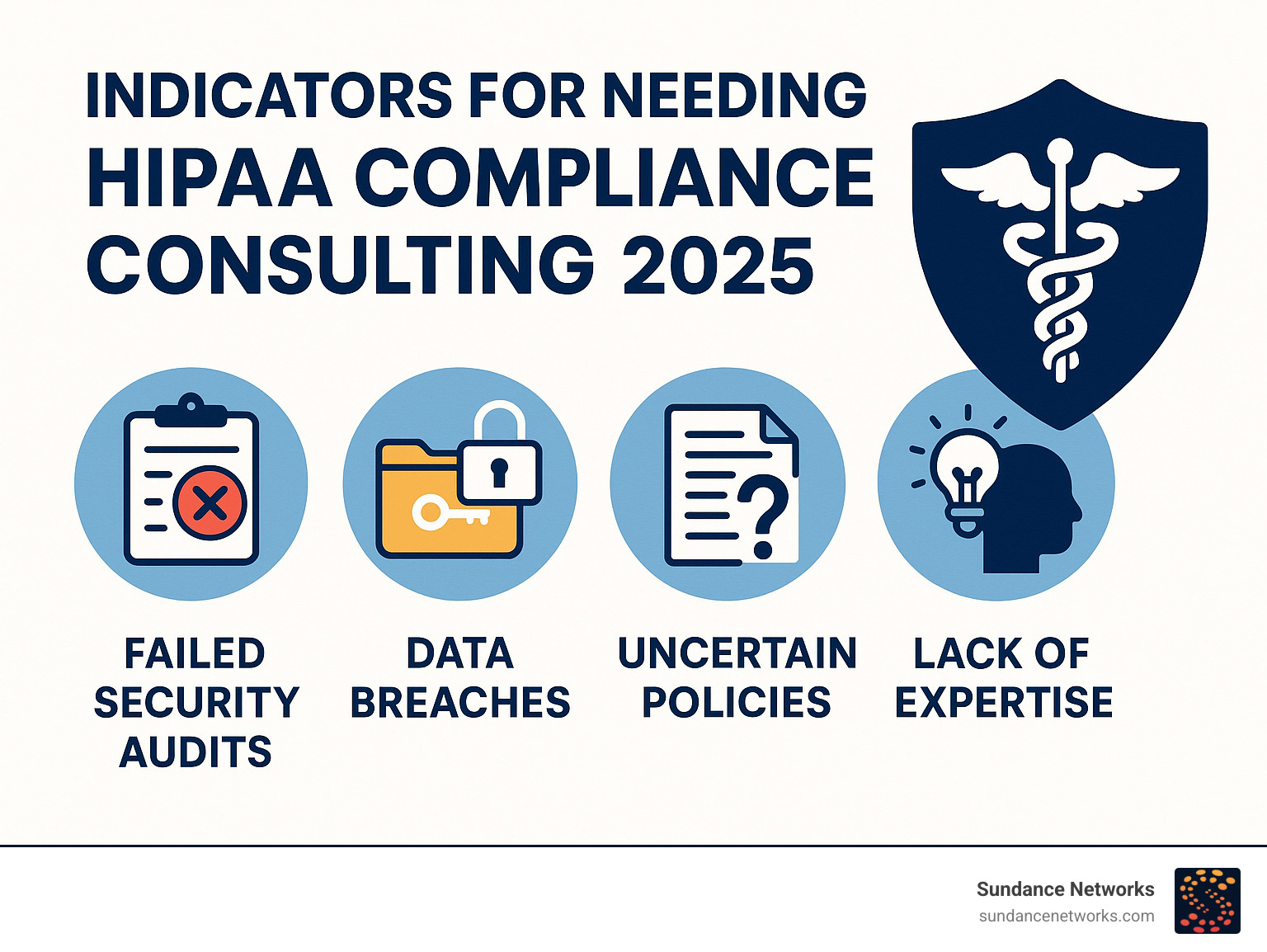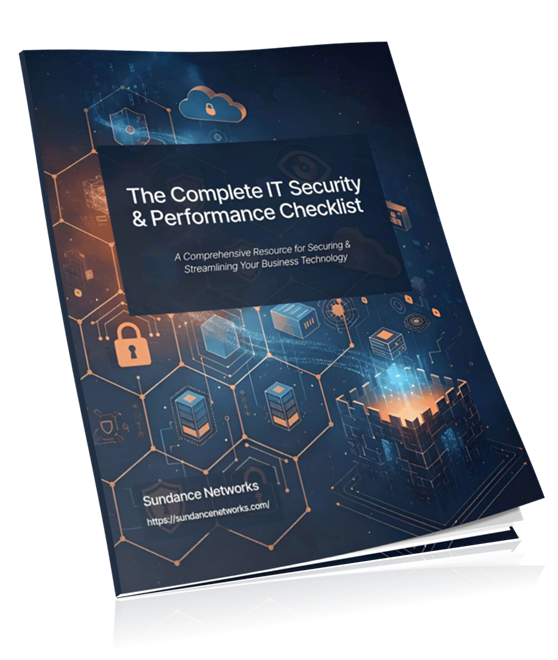
Facing the complex world of healthcare data protection in the environment of Manhattan HIPAA compliance, deciding if compliance consulting is right for your organization is a integral decision. It helps businesses avoid steep penalties and protect sensitive patient information.
You might need HIPAA consulting if your organization:
- Struggles with regulation complexity: HIPAA rules can be overwhelming.
- Lacks internal resources: Small or new organizations often don’t have dedicated staff.
- Needs a quick setup: For new entities or those behind on compliance.
- Is unsure of current program effectiveness: You think you’re compliant but aren’t certain.
- Wants an unbiased assessment: An outside expert can spot hidden gaps.
- Aims to avoid costly fines and reputational damage: Breaches are expensive.
I’m Ryan Miller, owner and founder of Sundance Networks, Inc. With over 17 years in information systems and 10+ specializing in information security, I bring experience in compliance consulting to help organizations steer complex regulatory demands. Below, I’ll help you recognize why a consultant is your next best move.

Understanding the HIPAA Landscape: What’s at Stake?
Navigating healthcare data is complex. At its heart is the Health Insurance Portability and Accountability Act of 1996 (HIPAA), the foundational U.S. law for keeping patient data safe. Its goal is to set national standards for protecting sensitive patient health information (PHI) from being shared without patient consent.
Protecting PHI and electronic Protected Health Information (ePHI) isn’t just a legal requirement; it’s a moral obligation. Patients trust you with their most personal details. Breaking that trust has devastating consequences for both the individuals affected and your organization’s reputation and finances.
Consequences of Non-Compliance
Ignoring HIPAA compliance leads to severe outcomes:
- Financial Penalties: Fines for non-compliance are steep, ranging from $100 to $50,000 per violation or per record, with an annual maximum of $1.5 million. A single data breach can cost over $2 million in fines and related expenses.
- Reputational Damage: Non-compliance erodes patient trust and damages your organization’s reputation, making it difficult to attract and retain patients.
- Legal Scrutiny: Violations can trigger government investigations from the Office for Civil Rights (OCR), increased oversight, and potential civil or criminal charges.
- Operational Disruption: Managing a data breach consumes significant time and resources, distracting from core business activities.
Proactive HIPAA compliance consulting and strong Cyber Security Solutions are far cheaper than the crippling costs of a breach.
Who Needs to Comply? Covered Entities and Business Associates
HIPAA’s rules apply broadly. The first step to compliance is understanding if your organization is a Covered Entity or a Business Associate.
Covered Entities (CEs) directly handle PHI for treatment, payment, or healthcare operations. This includes:
- Healthcare Providers: Doctors, clinics, hospitals, dentists, pharmacies, and nursing homes.
- Health Plans: Health insurance companies, HMOs, company health plans, Medicare, and Medicaid.
- Healthcare Clearinghouses: Entities that process nonstandard health information into a standard format.
Business Associates (BAs) are persons or companies that perform services for a Covered Entity involving the use or disclosure of PHI. Examples include:
- IT Service Providers: Managed service providers, cloud storage companies, or any business that handles medical records.
- Healthcare Billing Companies
- Law Firms and Accountants that access PHI.
- Document Shredding Services
If your organization stores, transmits, or uses PHI or ePHI, you are subject to HIPAA regulations.
The Core HIPAA Rules Explained
Understanding HIPAA’s fundamental components is key:
- HIPAA Privacy Rule: Sets national standards for protecting PHI. It governs how PHI is used and disclosed and grants patients rights over their health information, including access to their records.
- HIPAA Security Rule: Focuses on electronic PHI (ePHI). It mandates administrative, physical, and technical safeguards to protect the confidentiality, integrity, and availability of ePHI. It requires an annual Security Risk Assessment (SRA).
- Breach Notification Rule: Requires notification to affected individuals, the Department of Health and Human Services (HHS), and sometimes the media in the event of a breach of unsecured PHI.
- Enforcement Rule: Outlines the procedures for HIPAA investigations and the penalties for non-compliance.
- HITECH Act: Passed in 2009, this act strengthened HIPAA by increasing penalties, extending rules directly to Business Associates, and promoting the use of health information technology to protect ePHI.
The DIY Dilemma: Common HIPAA Compliance Challenges
Attempting to manage HIPAA compliance in-house presents significant challenges, especially for small to mid-sized practices. The process can feel like decoding a complex enigma.
Here are some of the common problems we see businesses encounter:
- Regulation Complexity: HIPAA is a vast collection of guidelines. Applying them correctly to a specific organization is confusing, and it’s difficult to be certain of full compliance without an expert review.
- Lack of Internal Resources: Smaller organizations often lack the dedicated staff, time, or specialized expertise to manage a comprehensive HIPAA program while also running their business.
- Keeping Up with Changes: HIPAA regulations evolve. Staying informed about new guidance and enforcement trends is a continuous effort that many organizations cannot sustain on their own.
- Inadequate Employee Training: Human error is the leading cause of healthcare data breaches. Research shows over half of employees lack proper PHI handling training, with a shocking 61% failing basic computer safety tests. This highlights the critical need for robust, ongoing training and a HIPAA awareness assessment.
- Improper Risk Assessments: HIPAA’s required annual Security Risk Assessment (SRA) is often performed inadequately. Organizations may focus on technical controls but overlook human factors or fail to identify all locations of ePHI, such as old systems or third-party apps, leaving significant security gaps.
These challenges highlight why a strategic approach is necessary. It often means reviewing your IT Budget Planning to allocate resources effectively. This is where HIPAA compliance consulting can be your secret weapon.
What to Expect from HIPAA Compliance Consulting Services
When HIPAA feels like an unsolvable puzzle, a HIPAA compliance firm can be an invaluable partner. They act as an extension of your team, guiding you through every step of the process.
Here’s what you can expect from engaging a consultant:
- Expert Guidance: Consultants offer specialized knowledge of HIPAA and HITECH regulations, translating complex rules into actionable strategies.
- Objective Assessment: An external expert provides an unbiased view, identifying vulnerabilities that internal teams might miss.
- Time Savings: Consultants streamline the compliance process, saving your team significant time to focus on core business operations.
- Risk Mitigation: Consultants help you avoid costly penalties and reputational damage by identifying and addressing compliance gaps, which includes strengthening your Disaster Recovery & Backup plans.
The Core Offerings of a HIPAA Compliance Consultant
Most HIPAA compliance consulting firms offer a comprehensive suite of solutions, including:
- Security Risk Analysis (SRA) and Gap Assessment: A foundational “health check-up” for your data security to identify vulnerabilities and assess risks.
- Policy and Procedure Development: Crafting a customized “rulebook” for your organization to ensure everyone handles patient data safely.
- Staff Training Programs: Designing and executing effective, documented training to address the human element of data security.
- Business Associate Agreement (BAA) Management: Performing due diligence and managing agreements with all your vendors and service providers.
- Breach Response Planning: Equipping you with a solid strategy to manage a data breach and steer notification requirements.
- Audit Support: Preparing your organization for potential HIPAA investigations or audits.
- Remediation Services: Providing recommendations and support to fix identified gaps and vulnerabilities.
- Interim or Designated Privacy Officer Services: Filling the role of Privacy Officer to oversee your compliance program.
A consultant’s risk assessment is a systematic process: they gather data on your systems, identify vulnerabilities, assess existing security measures, determine potential threats and their impact, and document findings with actionable recommendations.
The Financial Investment: How Much Does Consulting Cost?

The cost of HIPAA consulting is an investment in your organization’s security and future. The expense is minor compared to the potential fines and reputational damage from non-compliance. Costs are influenced by your organization’s size, complexity, current compliance posture, and the scope of services needed.
You might see hourly rates from $50 to $250, but project-based fees are more common.
- A full compliance package for a smaller, single-location organization could range from $4,000 to $12,000.
- For multi-location or larger organizations, services can range from $78,000+.
- Specific services like a HIPAA Compliance Assessment are typically around $15,000, a Gap Assessment about $10,000, and Remediation services often fall around $8,000.
When compared to potential non-compliance costs—fines up to $50,000 per record and over $2,000,000 for a single breach—investing in HIPAA compliance consulting is a clear strategic advantage that protects your practice and patients.
Making the Right Choice: How to Select Your HIPAA Partner
Choosing the right partner is a critical decision. You need a team that understands your unique needs and can provide custom, ongoing support.
When vetting a potential consultant, focus on these key areas:
- Industry Experience: Have they worked with organizations similar to yours?
- Certifications: Do they hold relevant credentials like Certified HIPAA Professional (CHP)?
- Reputation: Ask for client references and check their market standing.
- Scope of Services: Do their offerings align with your needs?
- Ongoing Support: How will they support you after the initial setup? This aligns with our approach at Sundance Networks, where our Managed IT Services & Security ensure continuous protection.
Key Questions to Ask a Potential HIPAA Compliance Consultant
To help you make a smart choice, ask any prospective firm these questions:
- “Can you describe your experience with organizations similar to ours in size and specialty?”
- “What relevant certifications or qualifications do your team members hold?”
- “What’s your approach to conducting Security Risk Assessments, and what will we get from it?”
- “How do you handle and document employee training to ensure it’s effective?”
- “What kind of ongoing support do you offer after the initial compliance work is done?”
- “Can you provide client references we can contact?”
Are There Alternatives to Traditional Consulting?
While consulting offers thorough expertise, it’s wise to explore other options:
- Compliance Automation Software: These SaaS tools can automate assessments, policy creation, and training. They are often budget-friendly but may lack customization, require significant internal effort, and don’t replace expert advice for complex issues.
- Managed Compliance Services: Offered by IT providers, these services bundle compliance with ongoing IT management and security. This provides a holistic solution, but ensure the provider has deep HIPAA expertise.
- In-house Compliance Officer: A dedicated officer has deep organizational knowledge. However, this is a significant salary expense (from $50,000 to $190,000+), and finding one person with comprehensive expertise across legal, IT, and security is difficult. They may also lack an external consultant’s unbiased perspective.
When considering alternatives, weigh your organization’s size, budget, and complexity. The best choice balances cost, convenience, and the level of expertise you need. Our experience with On-Premise or Cloud Solutions can also help guide your data storage and compliance strategy.
Frequently Asked Questions about HIPAA Compliance
How long does it take to become HIPAA compliant with a consultant?
The timeline to achieve HIPAA compliance with a consultant varies, but a typical timeframe is about 6 months. This can be shorter or longer depending on your organization’s size, complexity, and current compliance posture. For example, specific data analysis projects might take 4 to 12 weeks. A consultant will provide a clear roadmap to make the process efficient.
Can my in-house IT team handle HIPAA compliance alone?
While your in-house IT team is vital for implementing the technical safeguards required by the HIPAA Security Rule, they typically cannot handle compliance alone. HIPAA also requires administrative safeguards (policies, training) and physical safeguards (facility access controls), which fall outside of IT’s usual scope. Furthermore, a deep understanding of the Privacy and Breach Notification Rules requires specialized legal knowledge. Partnering your IT team with a HIPAA compliance consulting expert creates a powerful combination, ensuring a comprehensive and effective compliance strategy.
What is the main difference between the HIPAA Privacy and Security Rules?
The Privacy and Security Rules are two core components of HIPAA, but they have different focuses:
- The HIPAA Privacy Rule covers PHI in all forms (paper, electronic). It focuses on what information is protected and who can access, use, or disclose it, establishing patient rights over their data.
- The HIPAA Security Rule specifically covers electronic Protected Health Information (ePHI). It focuses on how this data must be protected through required administrative, physical, and technical safeguards to ensure its confidentiality, integrity, and availability.
In short, the Privacy Rule governs the use and disclosure of PHI, while the Security Rule governs the protection of ePHI.
Secure Your Practice and Protect Your Patients
Navigating HIPAA compliance and Manhattan healthcare IT is a complex and risky endeavor due to changing rules and constant cyber threats. Attempting it alone can lead to significant pitfalls and costly mistakes.
Expert compliance consulting is a strategic investment in your practice’s security and your peace of mind. It provides an unbiased assessment and clear guidance to help you avoid painful fines and reputation-damaging data breaches. A proactive approach is far more cost-effective than reacting to a crisis.
Here at Sundance Networks, we blend smart technology, scalable AI, and robust cybersecurity to create solutions that work. Our team brings deep, practical expertise in compliance, and we’re here to ensure your organization not only meets its regulatory duties but thrives, allowing you to focus on what you do best: caring for your patients.
Don’t leave your valuable patient data vulnerable. Let’s work together to build a strong, compliant, and secure environment for your practice by partnering with Sundance’s IT consulting in Manhattan NY.



